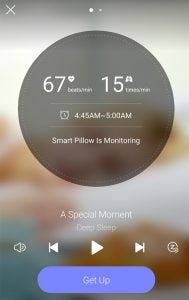While you rest your heart rate slows, allowing your blood pressure to drop and blood to flow more freely through your body. This allows healing and rejuvenation to occur and is just one step to a proper night’s sleep.
Understanding your heart rate zones and daily changes can help you understand your own overall physical health. Your sleeping heart rate is not only important but can pinpoint problems you may not even be aware of. Use this article to begin recognizing your own heart rate zones and learn to improve upon them.
Resting Heart Rates Defined

On average, a healthy, normal heart rate when sleeping is between 60 and 80 beats per minute (BPM) for an adult. However, this is not a set measurement as many factors can affect this rate. Negative factors include stress, obesity, medications, and even your emotional state can both raise and lower your average rates for various durations of time.
Your physical fitness level can also be a determining factor of resting heart rate. Those who are highly physical will generally have a lower resting rate due to the increased strength of their heart. This means the heart doesn’t have to pump as much to circulate blood through your system.
Heart Rate During Sleep Stages
Your heart rate during sleep stages will vary slightly, which is why you might see a peak at certain points of the night. This is completely normal and part of how your body is processing through the cycle.

Stage four is your REM stage. This is defined by rapid eye movement and is indicated by a raise in both respiration and heart rate. This marks when your brain is most active which also indicates a more active physical response.
Slow Resting Rates

High Resting Rates

Irregular Rates and What The Mean
Irregular resting heart rates are often an indication of an underlying condition. Sleep apnea creates a drop in the heart rate followed by a quick acceleration. Because sleep apnea stops respiration, the heart slows and then starts back up quickly. This creates irregular heart rates and may be diagnosed as true cardiac arrhythmia.
Improving Heart Rates
Luckily, there are ways to improve upon your resting heart rate if you have concerns. First, you need to learn what your own resting heart average is. This varies from person to person, and just because it may not fall into the average between 60 and 80 BPM doesn’t mean there is anything wrong or unhealthy with you.
If you have concerns, speak with your doctor and invest in a device that helps track your heart rate. With today’s technology this is easier than ever as most smartwatches and fitness trackers have a heart rate sleep tracker already built-in. There are also products such as pillows or monitoring strips that fit under your sheets that provide you an insight to your heart rate through the night.

You may be interested in: Best Heart Rate Monitors
Conclusion
Wondering about your heart rate at rest is actually a very self – conscious and healthy step to take. It is very indicative of your overall health and can provide you insight into why you might not be sleeping well, and when to speak with a doctor.
If you are curious about how to best track your own rates through the day and night, consider a sleep tracking device to provide you information on your own average BPM. Improving your rates can be done with simple changes to your lifestyle.